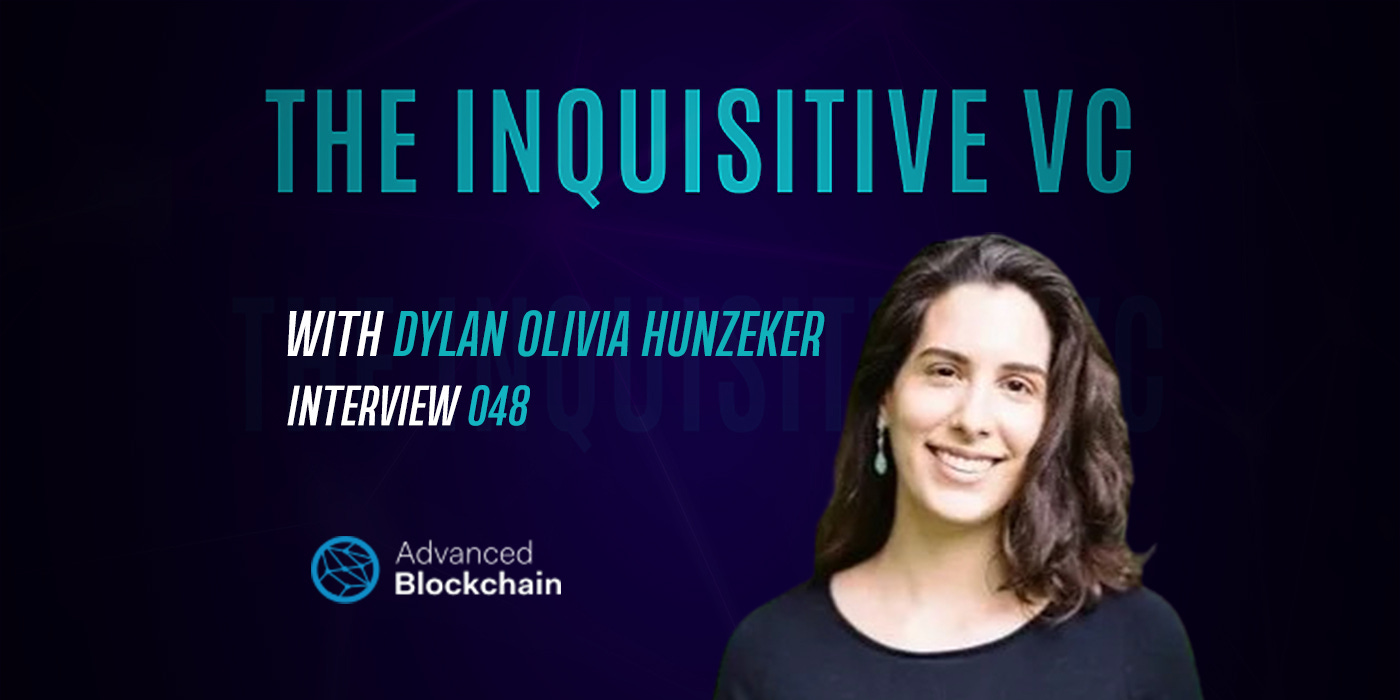Dylan Olivia Hunzeker is the Head of Ventures at Advanced Blockchain AG, a publicly listed investor and incubator. Prior to this, she was an Investor at Struck Capital Crypto, also having worked at Iconic Holding and Eigen Capital.
We talk about her journey in crypto, her time in China, investing in crypto and more!
The podcast is also available on your favourite podcast sources like Spotify, Apple and Youtube!
NA: We've been trying to set this up for a while, so it was great to finally have you on.
DOH: Yeah, I'm so excited. I'm sorry, it took so long. It's just been crazy and the market's been booming, so there's just been a lot to do.
NA: Yeah, fair enough. I'm keen to start with your background and your journey to crypto?
DOH: Yes. So, it's been a very long journey. I feel like I'm 85 years old, to be honest. I have been in crypto technically since I graduated college, I went to Columbia undergrad, went to Columbia College. I studied comparative literature and human rights. So, I was really interested in working for social good.
I did an internship with the UN. I thought that I would actually be a lawyer, probably a human rights lawyer, kind of like Amal Clooney and I was prepped to do that. I mean, I'd taken the standardized test to do that, the LSAT etc. And then I had a very good friend, a close friend actually, who works in crypto still, who was an early Bitcoin investor and an early Ethereum investor as well.
And so, he turned me on to crypto and told me that I needed to buy Bitcoin ASAP. I just became enamoured with everything he was saying, my mother was a computer scientist and my brother studied that in school. And so, I felt like I understood the value prop for crypto pretty immediately because in my family that kind of technology had been really emphasized both through their work experience and then through what they had wanted us to study. And even though I didn't major in it, I did know how to code and so I could read the white paper and understand it, like the lines of C.
But anyway, I started going down a rabbit hole. I started reading everything I could. Trying to actually go to meetups and meet people in New York at this time in 2016- 2017, it was really not cool. Like I would tell my friends that I wanted to do this for a living and people didn't understand what I was saying.
And so, I figured I should just start a small meetup to try and meet other people because crypto is a very peer to peer business. So, started doing very small meetups and then through that met a lot of other people that were really, really interested. And through that ended up actually meeting once a week on Saturdays to read new white papers that had been published.
Think about crypto and talk about it both philosophically and academically, cause some people in the group were academics. And through that group actually started publishing research papers that got published by CUNY, City University of New York. And then another one that got published by Ledger, which is Carnegie Mellon's blockchain journal out of their computer science department.
And then people started reading those papers and so when they started reading those, they were, you know, kind of interested in chatting about having us work with them more formally. And that's how I kind of started in advisory, but very organically at first and as did my close friends. So that ended up coinciding perfectly with the ICO boom. Because it was, at that time, a lot of people needed help with their white papers or their code, etc. Or even just marketing and like knowing who to talk to, or which meetups to go to. Since everything was still relatively insular, even when there was like this huge uptick and people that were interested in the market, of course as well.
But I knew I didn't want to do that forever, that wasn't a long-term goal to have an advisory. It was more like a very medium-term goal to get to either a project that I thought I would really enjoy being an early person at or to do something else and I'd always been interested in VC, but I didn't want to do trad VC. Right?
So, I kind of was more interested in doing some sort of like formalized crypto investment. But again, at the time, you know, there were firms that were raising money, there were accelerators that were coming out, you know, every few weeks but it wasn't like a career path, right?
It's not like I could've called a Columbia alum and just been like, “oh, Hey, like, you know, that crypto VC firm you've been out for 10 years.” Right. Because the space is just so early. So, I actually decided to move to China, which sounds crazy, but I've been to China many times through my undergrad. And I really came to feel that China and East Asia in particular, were going to be really important for crypto.
This was mostly a gut hunch, but everyone was saying that a lot of the volumes were coming from East Asia anyways. I knew nobody who lived in Beijing, but I applied for Tsinghua University to get my MBA and then I got a full scholarship. So I figured, okay, this will be a good opportunity. This was around the time the Schwarzman had been created also a few years prior.
So I thought, okay, like more and more people in the west are gonna understand that Tsinghua was this amazing school. And I really felt like in my life, I wouldn't just want a really good degree from the west. I would want a really good degree from the east because there are just so many more people, you know, China's the most populous country on earth.
I figured, okay. I'll just hedge my bets. Things have been going well, but let me actually just uproot my life, move to a city where I know exactly zero people and see what happens. So, the week before I left to go to China, I actually ran into an old friend of mine called Maomao Hu, he'd been in crypto for years.
And so we had actually just met it like meetups and through friends. He said, what are you doing? And I said, oh, I'm moving to Beijing. And he said, oh, I moved there last month. Why don't you come work for me at Eigen Capital this crypto hedge fund I'm now a partner at?
And I just said, okay, great. And like the day that I moved there, I like went to the office, got lunch and just started immediately. And it was like just unbelievable, kind of how seamless that whole situation became. Because I kind of left what had started in 2018 as like a bear market left, like this bull market advisory side to work at this crypto hedge fund that was kind of pivoting to focus on doing OTC.
They'd had a lot of different lines of businesses, but own tons and tons of Bitcoin for various reasons. And so, most of the employees were actually getting paid in Bitcoin. The firm was headquartered in Hong Kong, OTC was the main focus for what I was doing, but we had a market-making desk for altcoins, and then we had an advisory business.
So, got to work on those sides as well. And at the time there was this other small, like upstart that's doing market-making in Hong Kong called Alameda, Alameda Research as you know. And it was just a really interesting time to be doing like that kind of work in Asia, mostly because it was a little bit scary because so many people fled, right? Like a lot of people, I knew that have been working in crypto, left and said, this is a scam, and the government wasn't very friendly about crypto at the time.
I mean, even within Beijing, there were laws for different city districts that you couldn't even speak about crypto or disseminate information about it.
So, you know technically it wasn't legal to sell Bitcoin at that time. I thought a lot about the future and thought, you know what? I should probably go back, go home back to New York because I finished most of my courses. I love the people I've met. I love my professors. I love what I learned. I love the Chinese language. I love the food. I love the culture. You know, it's just that the government is making this a little hard.
But it was the best experience I could have had because I realized that it doesn't matter how hard the government tries to intimidate people.
People will be selling Bitcoin in Beijing and there will be lots of people that will be buying it. And so that was the biggest, like if you wanted a signal to hodl, that to me was like, I just remember people would come to our office and they would talk about how they would, and we can sell, we could sell a Bitcoin with very high fees because people were so desperate basically to just not hold their RMB.
And when I was a student there, the RMB was actually fluctuating enough such that like my first month, I remember if I had converted my cash to RMB, like one week prior to the time that I did to like to get my money into my Chinese bank account that I would have had like 17 to 25% more worth of it or something like that, do you get what I'm saying? Yeah. It was actually so volatile for certain weeks, Bitcoin was more stable, which is absurd to think about, right. Because China's the second-largest economy, well, depending on how you view it now, probably the largest and people were willing to basically break the law to hedge because there was lots and lots of talk about how in 2020 there was going to be this depression level event.
And so to me, it was so hard not to just be bullish and to feel like I knew something that other people didn't know after leaving China. It's interesting too because people in the US didn't understand yet because I was chatting with some friends Saturday about this, who are crypto investors. The part of the reason people from developing, and China's not a developing country, but a lot of people who got really wealthy hodling Bitcoin or holding Bitcoin are people who have at least a heritage or background in countries where the currency isn't stable. Right?
So like Andreas Antonopoulos as an example, right. He bought after Greece had to be bailed out. Right. So, you know, he's Greek. So, he has first-hand experience, you know, I'm half Nicaraguan. So, for me, like Bitcoin makes sense, but if you're totally like true blue American, I can understand why you just don't understand why you don't want your dollars. Right? Because everything worked out for you. I returned from Asia being like whatever was going on there I think that's the future and I'm always bullish on East Asia. in particularly like Chinese and Singaporean projects.
NA: Yeah, that's an amazing experience. And I can see how you think that you have this secret insight that probably not everyone understands and like how you mentioned people in the US probably don't get it as much as other countries who have faced currency situations, that's an example. I use a lot as well to explain it to people in New Zealand because the currency here and the financial system is so strong you don't really get why you need Bitcoin.
DOH: Yeah. And you know, it's interesting too, because these aren't just currencies. It's like, you're actually appending capitalism and you're upending a certain type of capitalism. That, to be honest, the US and a lot of Western countries have been desperate to keep, and you're totally redefining paradigms for like, even how things like how investment occurs or how value accrues within entities and who gets exposure to most of the value.
Right? So that's why I love crypto because it makes a lot more things egalitarian that weren't before. And that's in contrast to the reputation that we have for being very insular and only wanting to chat with each other. And, it’s very interesting that we have that rep, but then this is all about making society more equal.
NA: So, you came back to the States after an interesting experience in China and then what happened?
DOH: Yeah. So, I ended up working at Iconic Holding, a German crypto asset management firm that Michael Novogratz and Christian Angermayer and Allan Howard had invested into and or have actually and was very excited about working with that team because they had been known to be a very like marquee accelerator in the space.
And they still, I believe hold the best hit rate out of a European accelerator for blockchain. I'd have to double-check it you know, that was about 10 months ago, but yeah, I mean every single investment they had pre-seeded or seeded raised a Series A except for one. So, I think the hit rate was 96%.
So, I loved their model. A lot of the things that they were about to start doing I was very, very excited to work on. So, one of those things was a crypto hedge fund platform. So, we found that there were a lot of like traders or young, usually young men, to be honest, that were trading crypto.
And they wanted to start a fund because they were approached by people that knew what the returns were. They just didn't have expertise in fund admin audit like anything, most of them couldn't even get bank accounts. And so, a lot of what we started doing was realizing that we could create this place for people to come and we would do all of the setup and do basically just service them.
I was there for almost two years. And I really loved the team. I think that they're awesome. And yeah, it was great. And you know, still, actually, chat with them quite often, so, yeah.
NA: Yep. Okay. So that I can definitely see how that experience would have been super helpful in your career as an investor. Especially after meeting a lot of interesting people and understanding strategies. So, I think following Iconic, you got more actively involved as an active investor. And so how was that experience?
You know, your first time being a more active VC style investor.
DOH: Yeah. So, after Iconic, well during Iconic, I was a founding member and researcher. I wouldn't necessarily say co-founder, but I was one of the first researchers at a lab at Stanford called the Future of Digital Currency Initiative.
I started to realize not just while I was at Iconic, but also through Stanford, that I now had this network that I could go and utilize to be a really active VC. And so I really was excited about that prospect because to me and I just, decided to start doing a lot more active VC and ended up working at Struck Capital Crypto, which was a hedge fund, but they did early-stage crypto VC and found that to be so educational because it was like the first time that I could get my hands wet in terms of cutting checks and meeting founders and doing diligence and learning paradigms for investing from both trad VC because there is a traditional venture firm called Struck Capital, that's managed by the same individual, Adam Struck and ended up finding that I really enjoyed the work that I was doing. And so by spending so much time, like trying to find other companies and, and kind of being astonished at the pace of how things move.
I mean, crypto deals, the round is oversubscribed, like that night yeah. I have friends who are founders in the space and they have stated that half of the investors in their round, didn't even get on the phone with them and just sent them money and I've had founders tell me that people like DM them on Twitter and were like, “Hey, where can I send my USDC?” Like, you know, peoples diligence seems to have gone by the wayside. It's one of the reasons these deals are moving at lightning speed, but the more I was in the market, the more I realized that being an aggressive investor is the only, well, it's not the only way to get the highest upside, but it's a very good strategy.
So, I left Struck last month and actually started this month as Head of Ventures at Advanced Blockchain AG, which is a public company headquartered in Berlin and we are very, very aggressive.
We've been around since I believe the founding team has been around since 2013, and they're basically as OG crypto as you could get. Through this new role, I'm actually going to be very aggressive And I'm very excited also because we have an incubation side, we have a research arm of about 10 people.
We have a content team; we have an in-house auditing firm. We have all the tools. We have 56 engineers that are full-time staff that we deploy to our port co's. And everyone in the business, well, the vast majority of people have been doing crypto for a very long time. So, it feels very much like the perfect storm of both resources and strategy to make the best possible bets that we could.
Our goal is to actually keep incubating, keep iterating, and I'm hoping to cut. Like we cut, you know, almost this year, thus far, we've cut almost 20 checks actually.
But I'm hoping to double that or more in the next 12 months. I'm really grateful. And yeah, I mean, we can talk through that if you'd like, and if you have any questions about some of the stuff that we've incubated and some of the stuff that we're excited about specifically because the brands of Advanced Blockchain AG has been to do decentralized finance and interoperability plays.
But now we're actually hoping to do plays like that, but in the metaverse or in NFTs and gaming. And so you know I'm kind of leading the way for us to start investing in gaming companies and we might do some JVs with other funds and we're investigating that, but we've been really grateful for the investments we've been able to make, both on the token and the equity side. So, you know, equity investments we've done zCloak, which does zero-knowledge proof as a service for Polkadot. We've done Peaq which actually helps businesses that have well basically helps like IoT to become like web3.
And on the token side, obviously DOT, but Arweave, Fractal, Manta Network, Fei Protocol, Sentinel, Apricot Finance, Element Finance. Obel, which is a staking infrastructure provider for decentralized staking. Yeah. And, you know, we incubated a lot of companies as well, so yeah,
NA: I love the resource that you are definitely able to provide portfolio companies that's super helpful. I'm keen to kind of talk a little bit more about specifically, what areas that you're going to be looking at and what's exciting you. I know you mentioned you'll be focusing a bit more on gaming.
What does that really look like? I'd love to hear your thoughts on the current landscape that you're seeing around crypto games.
DOH: Yeah. So the one thing I've always said is I didn't want to invest in a game because I don't have expertise in which games are going to be good. Right? Like, I don't understand how the people that invested in Axie Infinity just like understood that what they were gonna do was gonna work.
And so, to me, I'm actually much more excited about investing in say like a gaming studio. And those have been popping up for blockchain games.
So, I do think we are open to also investing in games, but I think we'd have to think through the strategy of okay, let's assume 99% of these won't work. Whereas when we invest in DeFi, like a DeFi protocol or something, we never assumed that because we do so much of our own research and we have subject matter experts, even though most startup investments fail on average we don't feel that way about companies we're incubating right.
So I think part of the reason I don't want to do the games is because then we'd have to just admit that we don't necessarily know why one game is better than the other, which is a very slippery slope as an investor. And so, I think also I really like tools. Like, you know, I'm looking at a lot of YGG competitors, but trying to figure out why, like what would make, and it's not a zero-sum game, right? Like, I think YGG will be around forever, but just trying to understand why so many people have onboarded on to you know, one platform versus the other, and trying to look at what's driving the growth.
The one thing I've learned in this business is to, well it's kind of threefold first that the team is really important. So it's more important than in traditional VC, I think because things are a lot more nebulous and pivots are a lot more common and things are so competitive that they quickly get crowded.
So, then you have to have people that are creative and can think on their feet and can change. And there's also so much money that gets flooded in, but actually to be honest, don't believe as much in moats, like, and so in trad VC, you'll hear people say, oh, well, like what's the moat for this product?
I don't think in crypto moats matter, I think that what matters is people that can iterate quickly and have a lot of momentum behind themselves market themselves, get a critical mass of users and then find a way to use those users for either the same product or a different product down the line. Because crypto is just evolving so much more rapidly than other businesses that to try and use, like paradigms that have been successful in other industries or, you know, is impossible.
So for me, you know, we're hoping to invest in a gaming studio. We're going to announce probably in the next few weeks and a large part of that wasn't just that I went through the competitive landscape with the team and ask them to explain why they were better or how they were different or explain if they were going to work with that company, how they would do so and why, but it was because of the people that were on the team.
And also the way that they were like responding to those questions. Right? So, my biggest pet peeve is when people say that there aren't competitors or that they don't know of them, or if they really don't know of them because if you do this 20 hours a day, you should have as much info about who you're competing with.
And then second, when they get defensive and don't actually see the competitor as the competitor. Because to me, it's like, nobody's special, talk about egalitarian right. I mean, the playing field, is so level, really young kids can compete with people who've been in crypto for 15 years because that's just the nature of this business.
So, then it's very hard to not feel like the person that's so aware of the market, they know every intricacy of their competitor is going to do better than someone who like say may have more experience, etc. So, I think, and a lot of people, you know, if you're deligencing a team, right?
Like a lot of them don't even have LinkedIn anymore. They just have Twitter. A lot of them are anonymous now. And so, a lot of that has to be based on the conversation.
NA: Yeah, completely agreed. Everything is just so different in crypto. It's hard to bring, I guess, that traditional mindset or how things used to be done and apply it to crypto because it is so different.
DOH: It’s so different. I mean, like we could do a whole another episode about, you know, once, once I start putting out more of my own stuff we can talk through.
A lot of things that I think are going to change like the future of labour and already have, and why like the type of capitalism that we've had just has not worked for the vast majority of people that have lived in it. And I'm so passionate about that. I mean, like on my own I’ve written a full book about crypto and capitalism and thought about publishing it.
And, you know, I'm thinking more seriously about maybe putting it out as like bits into a medium article because it's very long and just having parts and, you know, just kind of having that to be integral to help people understand how I see crypto.
NA: Love that, I think we should wrap it up there, Dylan, I'm super keen to probably have another long conversation like this at some point to keep this conversation going. But I really appreciate your time and appreciate you coming on.
DOH: Thank you, Nawaz. I'm so happy we finally found time and you're a great interviewer and I like your podcast too, so yeah. Thank you so much.
Follow me and Dylan on Twitter here!
Disclaimer: The Inquisitive VC is provided for informational and educational purposes only and is not intended to provide commercial, financial or legal advice. Nothing in this article constitutes an offer of securities or regulated financial products or financial services to any persons or a solicitation to buy or sell any tokens or securities or to make any financial decisions. Do not trade or invest in any project, tokens, or securities based upon this podcast episode. The host and guests may personally own tokens or be an investor in projects that are mentioned on the podcast.












